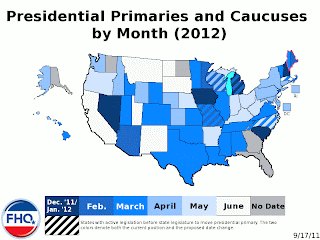As has been the case with similar non-binding caucuses that have been scheduled in February thus far (Maine and Minnesota), Colorado would avoid the threat of sanction from the Republican National Committee based on the fact that no delegates to the national convention are being directly allocated based on the first step (precinct level) of the caucus process. This was the same rule that in 2008 allowed Iowa and Nevada to circumvent sanction while the other pre-February 5 states -- including New Hampshire and South Carolina -- lost half of their delegates.1 In other words, there is something of a loophole to Republican delegate selection rules that is motivating at least some caucus states like Colorado to move up in an attempt to influence the nomination process.
As FHQ has stated, however, the question as to whether these non-binding contests will have an impact on the finalization of the 2012 presidential primary calendar, much less the race for the nomination itself, remains an open one. With Minnesota Republicans already scheduled on February 7 and Missouri poised to officially join that date tomorrow should the legislature in the Show Me state not reconcile differences in a March presidential primary bill currently stalled there, one can at least partially provide an affirmative answer to that question.
A few thoughts:
1) Despite saying earlier that a move to February was not likely -- though technically possible given Colorado state election law -- Colorado Republican Party Chairman Ryan Call and the state central committee appear to see a penalty-free, non-binding February caucus as too irresistible. And with Maine and Minnesota operating under a similar rationale, why not roll the dice? Colorado has what neither of those states nor Missouri has: swing state status in the general election. [Sorry Missouri. The one silver lining in the Show Me state is that a primary allows for the possibility of energizing a larger set of voters than the caucuses are likely to have. But let's see what happens in Jefferson City on Friday before going down that road.]
2) Strategically, February 7 -- aside from being penalty-free -- is probably more attractive than March 6 for Colorado Republicans based on the numbers alone. It is better to share a date with Minnesota and maybe Missouri than it is to share the spotlight with nearly ten other contests -- mostly primaries -- on March 6. Why pass that up?
3) Additionally, Iowa is often accused of having two bites at the apple with the Ames Straw Poll and the first-in-the-nation caucuses. Would Colorado and other non-binding caucus states have that same privilege? They could. The delegates chosen at the precinct level are not bound by the results of the first step of the process. [Truth be told, though, it is probably a touch naive to think that these are all open-minded delegates moving on to the county level without some holding some allegiance to one candidate or another.] Technically speaking, then, the candidates would potentially be interested in returning to the state during the point at which delegates are actually being allocated to attempt to lobby delegates for their support.
4) Speaking of Missouri, let's say that nothing is done about the March primary legislation tomorrow and the special session ends. Missouri would be locked into February 7. But why wouldn't Republicans there -- and there are at least two Republican state senators that support this -- opt out of the primary and hold an early, non-binding caucus on February 7? Well, the party would likely lose a great number of participants in the switch, but Republicans in Missouri could also circumvent the RNC rules that way and not lose half of their delegates. Again, FHQ will hit the pause button on this one until Friday afternoon.
5) FHQ has said it before and has received some push back, but Romney won caucuses in Colorado, Maine and Minnesota in 2008. Sure, he positioned himself differently in 2008 than in 2012. Yes, the Tea Party has impacted caucus states in the time since then. But as we have seen with debate performances from the former Massachusetts governor, there is something to be said for having done this before. Romney has been able to put together a winning slate of delegates in these states before. That doesn't mean the other candidates cannot, but it does mean that Romney -- even if all the 2008 caucus-going supporters don't come back -- has something of an organizational infrastructure advantage over his counterparts. Quietly, Romney was to caucuses in 2008 what Obama was on the Democratic side. His efforts just got lost among a sea of losses elsewhere on Super Tuesday.
--
1 Incidentally, one aspect of all of this that is not being talked about at the moment is that if Iowa, New Hampshire, Nevada and South Carolina are forced into January, all but Iowa would face the 50% delegation penalty that all other pre-March 6 states will face. That includes Nevada in 2012 because as a means of attracting candidate/media attention, Nevada Republicans elected to make the precinct caucus results proportional and determinative in terms of the delegate allocation.


